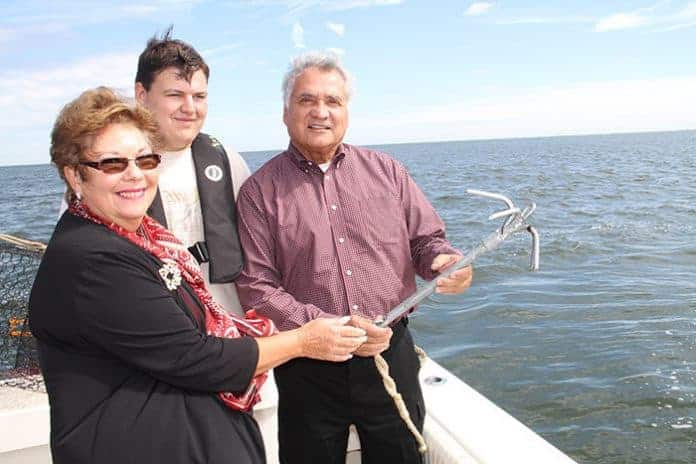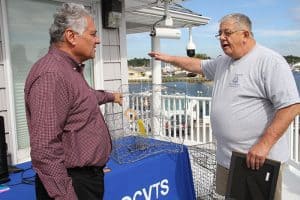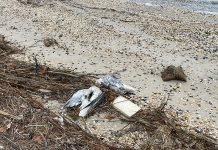
WARETOWN – Standing on the starboard side of the Research Vessel Sirenia, Quinn Figueroa, a senior at MATES, holds the grappling hook in his hand ready to latch on to a crab trap that has laid dormant on the bottom of the Barnegat Bay.
Moments after a quick toss into the water, a crab trap is pulled up onto the deck of the boat. There are no crabs this time, making it an easy retrieval and quicker analysis to do back at the dock.
“Thanks to this program, these students are getting the word out about the importance of removing hazards such as derelict crab traps from the Barnegat Bay,” said Ocean County Freeholder Director Joseph H. Vicari.
The Ocean County Vocational Technical School’s Marine Academy of Technology and Environmental Science (MATES), in partnership with the Conserve Wildlife Foundation of New Jersey, has received funding from the National Oceanic and Atmospheric Administration (NOAA) for another two-year period to recover and analyze abandoned fishing gear found within the Barnegat Bay.
“Over the grant cycle from 2015 to 2017, we have recovered 1,274 abandoned traps ranging from the Metedeconk River to south of Little Egg Harbor, with over 90 percent of them being crab pots,” said John Wnek, who is the supervisor at MATES. “Working with the Conserve Wildlife Foundation of New Jersey, Monmouth University, Stockton University, as well as local fishermen, our students not only recover the pots, but also collect data on the condition, cause of loss, and the marine life that is found along with the pots.”
If they were not removed, the crab traps would otherwise catch and kill marine life, as well as disrupt navigation and damage sensitive ecosystems. Throughout the course of the program, 27 MATES students collected 505 abandoned pots and analyzed well over 1,100 of those that were recovered.
“The Barnegat Bay is a major tourist destination in Ocean County, and it is also a way of life for many local fishermen,” Vicari, who is also liaison to Ocean County Vo-Tech, said. “Besides crab traps, volunteers are removing things such as tires and garden hoses that end up in the Barnegat Bay.
“While those are a few of the bulkier pollutants, we also need to be more aware of things such as plastic bags and bottles contaminating the waterways. Visitors and residents are encouraged to help keep Ocean County clean and protect the ecosystems that are important to our environment,” Vicari said. “I want to thank the MATES students for their continued efforts to not only make the waterways safer for recreational use, but for the marine life in the Barnegat Bay as well.”
Vicari noted that it takes hundreds of years for something as simple as a plastic water bottle to breakdown.

“Being mindful of the environment is such a simple step to take,” Vicari said. “It’s a step that goes a long way.”
As far as the continuation of the crab trap removal program, NOAA has agreed to fund $20,280 for another two-year cycle of the program for 2017 to 2019, with the goal being to recover 600 additional crab pots from the Barnegat Bay and learn more about the movement of crab pots during tidal shifts and storms.
“The programs that are part of the MATES curriculum are unique ways that give students hands-on opportunities to help out the environment and learn about the economic and environmental impacts that things such as these crab pots have on the Barnegat Bay,” said Nina Anuario, Presidents of the OCVTS Board of Education. “I am glad to see this program have the success that it has had and look forward to seeing more accomplishments over the next two years.”
A key component to the program is having a permanent place to dispose of the crab pots and to do analysis.
The Ocean County Board of Chosen Freeholders recognized Spencer’s Bayside Marina, located at 65 Pennsylvania Ave., for allowing MATES and the Conserve Wildlife Foundation of New Jersey the use of their marina as a base for assessment and disposal of the crab pots.
“This program is great not only for the Barnegat Bay and marine life, but also for my customers and business,” said Spencer Hondros, the owner of the marina. “It is great to see kids who are dedicated to making a difference and protecting the environment.”






